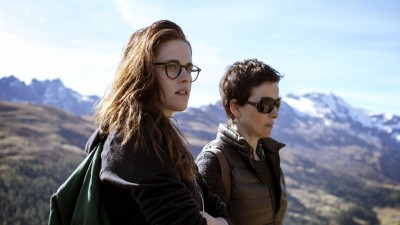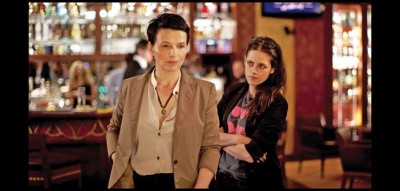| Reviews & Columns |
|
Reviews DVD TV on DVD Blu-ray 4K UHD International DVDs In Theaters Reviews by Studio Video Games Features Collector Series DVDs Easter Egg Database Interviews DVD Talk Radio Feature Articles Columns Anime Talk DVD Savant Horror DVDs The M.O.D. Squad Art House HD Talk Silent DVD
|
DVD Talk Forum |
|
|
| Resources |
|
DVD Price Search Customer Service #'s RCE Info Links |
|
Columns
|
|
|
Clouds of Sils Maria
A representative scene from Clouds of Sils Maria shows Val (Kristen Stewart), the 20-ish personal assistant to aging screen and stage star Maria Enders (Juliette Binoche), defending the schlocky sci-fi film starring bratty young Lindsay Lohan clone Jo-Ann Ellis (Chloe Grace Moritz), who will be acting with Maria in the revival of a play that launched her career twenty years ago.
During the scene, Maria scoffs at Ellis' performance in the sci-fi film within the film, and then laughs incredulously when Val tries to praise Ellis' ability as a performer to reach deep within herself to act for a mainstream film that Maria regards as beneath her own serious artistic pedigree. Maria's sudden outburst of laughter is the only genuine, spontaneous moment in Clouds of Sils Maria.

The film begins with Val juggling the responsibilities of Maria's busy acting career with multiple cellphones. She accompanies Maria on a train to Switzerland to attend a tribute to a playwright named Wilhelm Melchior (Valery Bukreev), who wrote the play that made Marie famous two decades ago, called Maloja Snake which is about a young girl who drives an older woman, with whom she has a tumultuous relationship, to commit suicide.

With Melchior's large estate as the primary backdrop for the film, Sils Maria would become a particularly claustrophobic chamber drama if the two main characters didn't leave the stuffy estate, which is rare during long sections of the film. When Val isn't seemingly dismantling Maria's mental state during the confusing moments when the play and film become one, they are hiking through the Alps, rehearsing lines. The film's visuals alternate between drab, dark interiors and the vastness and natural beauty of the mountain ranges, which, visually, almost helps relieve some of the pressure created by the claustrophobic feel of the interior scenes. A sense of pressure is finally relieved when the viewer is freed from the suffocating confines of Melchior's estate, where Maria and Val play out their Persona-lite psychodrama.
At Melchior's estate in the Swiss Alps, Val and Maria are consumed by a kind of isolation that somehow inadvertently becomes indicative of the self-important, self-consuming attitude Maria has in regard to her perceived importance as a performer. The "Clouds" of the film's title refers to the place where Maria has her head firmly placed. Maria's and Val's isolation in the Alps is the best (probably inadvertent) metaphor for the place above others that she has placed herself as an artist. Rather than take risks, as Ellis did in the film's fictional sci-fi blockbuster, Maria places herself high above the world, in the mountains, in the clouds, and surrounds herself with people, such as Val, who affirm the perception she has of herself as a serious actress.

The DVD
The Video:
The film's cinematography is the DVD's highlight. Sils Maria seems to be the kind of film that would have no room to emphasize its visuals, but the film's cinematography of the natural world is the only aspect that has any sense of life and vitality. The aspect ratio is 2.40:1, enhanced for 16:9 TVs, and seems almost completely out of character for the closed-in, dreary feeling that the film exudes in most of its scenes. The film's visual centerpiece, a weather phenomenon in which banks of clouds snake through a vast, winding mountain range, has a kind of grandeur that Sils Maria doesn't earn or build up to during its plodding story, but this particular shot looks really nice on a widescreen television. However, nice cinematography isn't enough to make the film feel any less dull.
The film's color pallet also transfers nicely to DVD, especially when played on large-screen HD TVs. The dark, cool colors- many shades of blue and grey- convey the story's tone quite accurately. Dim rooms in expensive homes, the Chanel wardrobe that Maria wears, (a company that helped finance the film, giving some of the most gaudy, high-end product placement I've seen in any movie) place Sils Maria firmly in a world of wealth, hard, flat surfaces, and a sense of coldness and distance that only seem to happen in films about affluent people like Maria.
Sound:
5.1 Dolby Digital. The film's confined, stuffy, chamber drama feel is given a really good audio mix that you'd expect to hear in larger-scale films with more characters, more action, and more locations. As it goes, quiet scenes, dialogue-heavy scenes (of which there are many), and a Classical music score envelop the viewers and pulls them into the film's world, even if it is excruciatingly boring.
The film's drama is on a small, cerebral scale through much of its running time, but long, tense dialogue scenes between Maria and Val are actually enhanced by the audio when it is spread over multiple speakers, showing that even supposedly simple dialogue scenes benefit from a multi-layered sound mix, and that quiet scenes in films can have depth and dimension when it comes to the audio of the film's world.
Like the cinematography, the audio is one of the technical aspects that enhances the viewing of the film.
An alternate 5.1 Dolby Digital track is in French. There are also English, French and Spanish subtitles.
Extras:
There are no extra features on the DVD version of the film.
Final Thoughts:
Clouds of Sils Maria is a dull slog through the ego-driven world of an aging actress who is losing control over the sense of legitimacy that she once held as a younger woman working in an industry that places too much emphasis on youth. However, one representative scene in the film, in which she derides the performance of her co-star in a piece of work she perceives as artistically illegitimate, exposes Maria as pretentious, thus dragging the entire film down to her limited, condescending perspective. As a story about the nature of performance and the many ways that an actor's personal life can be deeply affected by a role that she is completely absorbed in, the film fails, in comparison to similarly-themed films like Ingmar Bergman's masterpiece about an actress so lost and far gone in the world of performance that she loses all sense of self, Persona.
|
| Popular Reviews |
| Sponsored Links |
|
|
| Sponsored Links |
|
|
| Release List | Reviews | Shop | Newsletter | Forum | DVD Giveaways | Blu-Ray | Advertise |
|
Copyright 2024 DVDTalk.com All Rights Reserved. Legal Info, Privacy Policy, Terms of Use,
Manage Preferences,
Your Privacy Choices | |||||||













